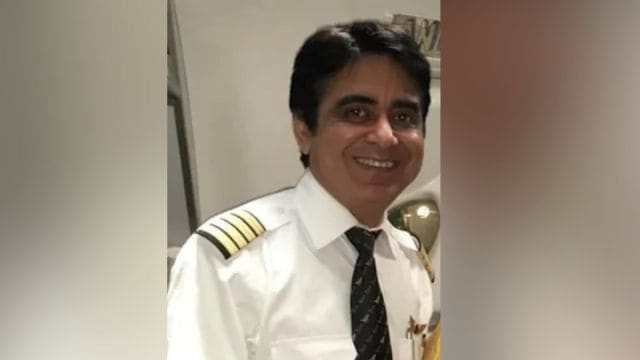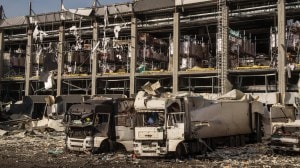The 91-year-old father of Sumeet Sabharwal—one of the pilots of the ill-fated Air India Boeing 787-8 aircraft that crashed in Ahmedabad on June 12—has demanded that the central government initiate a formal investigation into the crash, alleging that the preliminary probe report released in July by the Aircraft Accident Investigation Bureau (AAIB) and selective leaks have tarnished his son’s reputation and adversely affected his own health. Sumeet Sabharwal’s father Pushkaraj Sabharwal also termed the preliminary probe report as “deficient, diversionary and discrepant”, and objected strongly to speculation and insinuations about his son’s mental health and the pilot suicide theory doing rounds in sections of the media.
In a letter addressed to Ministry of Civil Aviation (MoCA) Secretary Sameer Kumar Sinha and AAIB Director General GVG Yugandhar, Pushkaraj Sabharwal sought an investigation under Rule 12 of the Aircraft (Investigation of Accidents and Incidents) Rules, 2017. The provision empowers the central government to order a formal investigation if it deems it fit, even if the regular investigation by the AAIB is already underway. Pushkaraj Sabharwal has sought the formal investigation to be headed by a retired judge of the Supreme Court, and include experts as well as pilot representatives.

He argued that the absence of a formal enquiry conducted in accordance with Rule 12 of the of the Aircraft (Investigation of Accidents and Incidents) Rules coupled with the selective information being released is detrimental to him and affects his “Fundamental Rights, including the right to reputation of my deceased son”.
“…Rules state that the purpose of the AAIB’s investigation & preliminary report is to provide the information about ‘what’ happened. The preliminary report on the contrary does not allude to the ‘what’ happened or the bare facts of the crash, instead resorting to insinuations on the one hand and offering copious clean chits to the manufacturer/s on the other. The report in its present form is deficient, diversionary and discrepant,” Pushkaraj Sabharwal wrote in the letter, adding that the report only puts out selective information of the preliminary investigation.
“The said selective leaks have led to speculation by the electronic and print media, both in India and abroad. There have been innuendos and suggestions in the media…that Captain Sabharwal was under tremendous psychological pressure and therefore was contemplating committing suicide. These innuendos have very adversely affected my health and mental setup and the reputation of Capt Sumeet Sabharwal. They tarnish Capt Sabharwal’s reputation, which is a Fundamental Right guaranteed to a citizen of India under Article 21 of the Constitution of India,” he wrote.
Dismissed the speculation around his son’s mental health, Pushakraj Sabharwal wrote: “The reasons attributed in such reporting suggest that as Captain Sabharwal was divorced, it had caused him anxiety and depression. It even ignores the fact that Captain Sabharwal was divorced about 15 years ago. The other speculation relating to the cause for Captain Sabharwal being desirous of committing suicide has been his mother’s death. His mother died more than three years ago. After that, Captain Sabharwal had operated more than 100 flights without any incident or accident. It is most pertinent to note that in over 25 years of flying, Captain Sabharwal had not had a single incident or accident-causing fatalities or otherwise”.
The AAIB’s preliminary investigation report, released a month after the accident, said that the Air India Boeing 787-8 aircraft crashed after both its engines were starved of fuel as the two fuel control switches transitioned from ‘RUN’ to ‘CUTOFF’ position within a second of each other moments after lift-off. From the cockpit voice recorder data, the preliminary probe report notes that one of the pilots asked the other why he cut off the fuel, to which the other pilot responded saying he did not.
Story continues below this ad
To be sure, the report didn’t mention that fuel control switches—which allow and cut fuel flow to the plane’s engines—moved physically, and used the term “transitioned” to describe the change of mode from RUN to CUTOFF. It also didn’t state these were moved by either of the pilots. However, the selective information presented in the report had many believing that it implicitly pointed a finger at the pilots, particularly Sumeet Sabharwal, a highly experienced pilot.
The report did not issue any recommendation to other operators of the Boeing 787-8 aircraft and its GE engines, suggesting that the investigators did not have a reason to believe that there was any issue with the plane or its engines. In his letter, Pushkaraj Sabharwal alleged that the preliminary report “appears to have drawn certain conclusions based on the external pressure exerted by the so called representatives/technical experts representing the manufacturer viz Boeing and General Electric (GE)”. He also highlighted the two fatal crashes involving Boeing 737 MAX aircraft in 2018 and 2019, which led to the revelation that Boeing had not informed airlines and pilots about a crucial software change, which ultimately led to those accidents. Initially, pilots were being blamed for the first of those crashes.
Around the time the preliminary report of the Ahmedabad crash investigation was made public, reports by a few US-based publications suggested that deliberate action by one of the pilots was most likely the cause of the crash in which 260 persons perished—241 of the 242 people on board and 19 on the ground. While the preliminary report was released around a month after the accident, the final investigation report should ideally be released within a year of the crash.
Requests for comments mailed to the offices of MoCA Secretary and AAIB Director General did not elicit a response. The AAIB on July 17 had issued an appeal urging the public and the media to “refrain from spreading premature narratives” around the ongoing investigation into the tragic crash. In a public appeal, Yugandhar had said that sections of the international media were “repeatedly attempting to draw conclusions through selective and unverified reporting”, and termed it “irresponsible” as the investigation was still on. Yugandhar said that the preliminary report only attempted to only provide information on what happened in the crash, and it was too early to arrive at any definite conclusions.
Story continues below this ad
In his letter, Pushkaraj Sabharwal wrote that the government and the AIIB should issue a formal press release clarifying that the preliminary investigation’s aim was not to fix responsibility but to prevent air accidents and incidents in future. “That no comments have been made in the report with regard to the pilot Captain Sabharwal, i.e. my son and that any reports in the media are merely speculation,” he wrote.

































